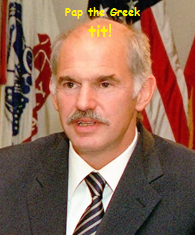LONDON – The main Greek political parties are now racing to try and rebuild the trust of the international community, by the creation of a unity government, fast enough to obtain the next tranche of aid from the ‘troika’ of external creditors before the country runs out of funds, towards the end of this month. 
Thus, and according to reports in Greek TV cited by Bloomberg, and others, the main political parties were nearing an agreement on a unity government this afternoon. However, government spokesman Angelos Tolkas told state-run NET TV that there is still a sticking point, the leader of the main opposition party continues to demand that Mr.Papandreou step down as a ‘sine qua non’ condition for participating in a coalition government.
Significantly perhaps, 52% of those who took part in a very recent 1,000 person poll by Alco, for the newspaper ProtoThema, said they preferred a unity government, compared with 36% who called for elections.
Also of interest, according to the media former European Central Bank vice-president Lucas Papademos is the name most often mentioned as the possible head of a new unity government.
As an aside, but very much related to the Eurozone crisis in general, Reuters today cites remarks from the President of Goldman Sachs’s wealth management division, Jim O’Neill, on BBC Radio, to the effect that it will be “really interesting” to see how the markets react to the ECB’s comments when they reopen on Monday. A member of the ECB is said to have said on Saturday that the option of ending purchases of Italian bonds, unless Rome delivers on reforms, is frequently debated.
The fact, however, is that both Juergen Stark and the new ECB President, Mario Draghi, indicated last Thursday that the central bank is a reluctant buyer of Italian bonds. Nonetheless, at first glance the above report seems to go a tad further.
Lastly, Mr.O’Neill is cited as having said that, “But it is all very fragile and the markets are requiring a stronger leadership from within these countries as well as from the ECB.”







